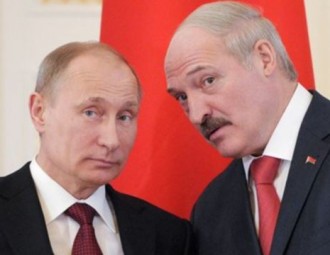TASS: Russia, Belarus build up strategic partnership

It would be inappropriate to say that relations are mending because they have never been spoiled by and large, writes Lyudmila Alexandrova, TASS reporter.
Sporadic trading and economic controversies and the past few years of economic turmoil have not prevented Russia and Belarus from pushing ahead with strategic partnership, Russian experts said in the wake of the just-unveiled plans for creating a Russian air base in Belarus and President Aliaksandr Lukashenka’s statement to the effect Minsk had no intention to turn away from Moscow towards the West. It would be inappropriate to say that relations are mending because they have never been spoiled by and large. Geopolitical bearings and economic disputes are utterly different matters.
Russian President Vladimir Putin has signed a decision to create a Russian air base in Belarus. A document to this effect has been published on the official legal information portal. Since December 2013, a squad of Russian fighter planes - four upgraded Sukhoi Su-27SM3 planes - has been on duty alongside their Belarusian counterparts. Another six Sukhoi fighters joined in last March. Now, after the agreement has been signed to create a full-scale air base in the neighbouring country, the flight group’s strength will be expanded to that of a regiment. Russian Defense Minister Sergey Shoigu declared plans for deploying an air regiment in Belarus back in April 2013. So it would be utterly wrong to say that the presence of Russian combat aircraft in Belarus will happen overnight.
After a meeting with Russian President Vladimir Putin last Friday Belarusian President Aliaksandr Lukashenka called for ending all speculations regarding Belarus’s hidden intentions to turn West.
"It’s high time to end all talk about Belarus turning West and so on and so forth," he said.
Belarus is Russia’s closest economic, military and political ally, the deputy director of the CIS Studies Institute, Vladimir Zharikhin, has said.
"But an ally is not a vassal. It would be wrong to expect Belarus will replicate our foreign policy and foreign economic steps 100%," the on-line media resource VZGLYAD (GLANCE) quotes Zharikhin as saying. "Our relations have never gone too bad by and large," an expert on Belarusian affairs at the Higher School of Economics, Dmitry Bolkunets, has told TASS. "There were local conflicts, there was casual misunderstanding between the two parties, but the global trend is Russian-Belarusian relations have been developing more successfully than those between other countries in the whole post-Soviet space. Belarus is Russia’s most stable ally."
The deployment of the Russian air base, he believes, is consonant with the agreements concluded within the framework of the Union State of Russia and Belarus and the Collective Security Treaty Organization, which is in fact Russia’s response to US policies in Europe. "Belarus as Russia’s ally is providing its territory for protection against likely threats."
"Belarus will remain Russia’s strategic partner. It will not sign any agreements with the European Union, because it is clear that Europe is unprepared to support the Belarusian economy," Bolkunets said with certainty.
Saying relations between the two countries have been mending is not correct. They have never got bad, the president of the Centre for Current Politics, Sergey Mikheyev, has told TASS. "All such media speculations have had nothing to do with the reality. The moment Russia and Belarus had the milk dispute, there followed speculations Belarus was changing its foreign policy vector. That’s just nonsense. As far as trading disputes and other business matters are concerned, they have always been and they will always be. But the real geo-political orientation of Belarus has never changed since Lukashenka rose to power, and it remains unchanged."
The expert believes that a turn towards the West would have upset Belarus’s current economic model. "Minsk would gain no political dividends. Relations with Russia and the state of the economy would get worse."
"Geopolitical orientation is one thing while trading and economic relations are an entirely different matter. Belarus will surely be seeking specific benefits," Mikheyev said.
-
03.01
-
07.10
-
22.09
-
17.08
-
12.08
-
30.09








































